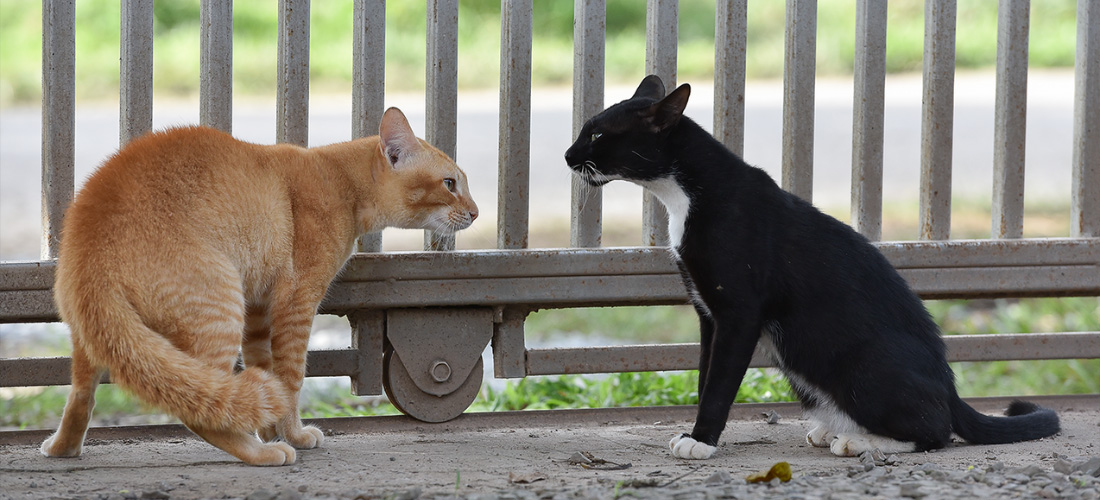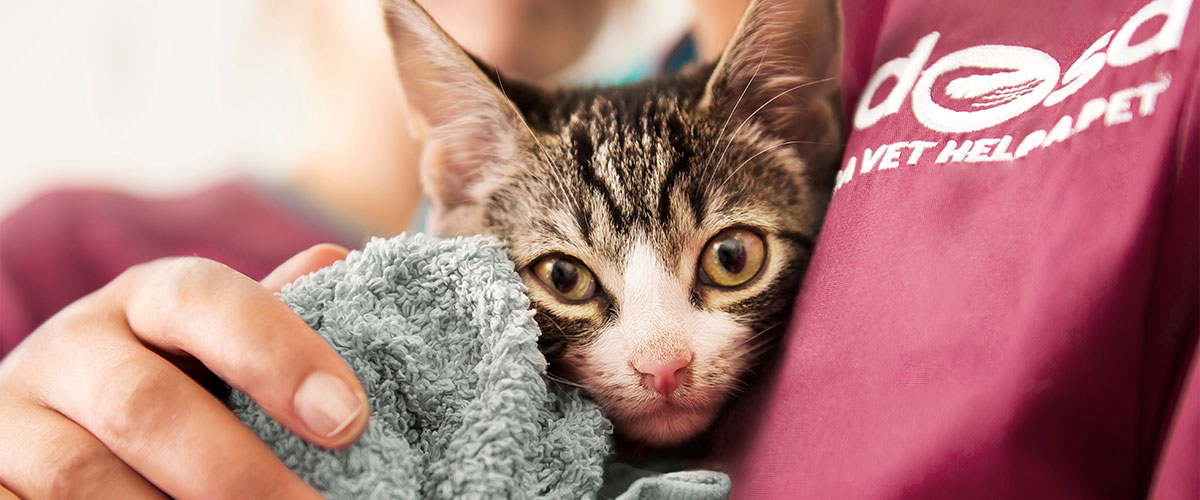FIV (Feline AIDS)
Overview
- FIV is a virus that infects cats and weakens their immune system, making them prone to illness and infections.
- FIV spreads in saliva, usually when an infected cat bites another cat – it doesn’t transfer to humans or other animals.
- FIV often goes unnoticed for many months or years before it starts to cause a problem.
- There is no cure for FIV, but with an early diagnosis, and careful management, it’s possible for FIV positive cats to live a long, healthy life.
- However, once FIV starts to cause symptoms and illness, sadly the outlook is poor, and at this stage, many cats start to suffer, or die from an illness that a healthy cat would be able to fight.

FIV is a virus that can infect cats and weaken their immune system. The virus attacks white blood cells (infection fighting cells) which makes them much more prone to becoming unwell, and less able to fight off illness and infection.
How does FIV spread?
FIV spreads in saliva (spit), most commonly when an infected cat bites another cat. It’s most common in un-neutered male tomcats and stray cats. It is possible but rare for FIV to spread between cats that groom or lick each other in a friendly manner, and for an FIV infected mother to pass the virus to her kittens.
FIV can’t survive for long outside of the body, so doesn’t pass from cat to cat on surfaces, people’s hands, or clothes.
What happens if my cat catches FIV?
It’s very rare for FIV to cause any noticeable symptoms to begin with, and because of this, it only tends to get diagnosed, once a cat has been infected for a while and their immune system is weakened. If your cat has been diagnosed with FIV, there is no way to get rid of it and it’s likely to cause illness at some point throughout their life. However, it tends to develop slowly and with the right management, infected cats can stay healthy for months, years, or even live a normal lifespan.
Symptoms of FIV in cats
Once symptoms of FIV start to appear you may notice:
- Ongoing diarrhoea
- Red, painful mouth and gums (gingivostomatitis)
- Sneezing, runny nose and weepy eyes
- Skin infections
- Low energy (lethargy)
- Swollen lymph nodes (glands)
- Weight loss
- Eating less than normal
- Taking a long time to recover from infections
Diagnosis
FIV can be diagnosed with a blood test from your vet. Depending on your cat’s symptoms, age, and when they were exposed to FIV, they may need to be tested a second (or even third) time to confirm a diagnosis. This sometimes means sending your cat’s blood test to an external lab to be tested.
Treatment
Sadly, there is no cure for FIV but there are plenty of things you can do to help keep your FIV positive cat healthy and happy for as long as possible:
Keep them indoors
It’s important to keep FIV positive cats indoors and away from other cats – this is to protect them from illness/infections, and prevent them spreading the virus to other cats. However, it’s really important for them to still get plenty of exercise and stimulation by providing them with lots of toys, playtime and things to scratch. Cat proofing your garden/providing a garden enclosure may also be an option. Read more about exercising your indoor cat.
If your cat has recently been diagnosed with FIV and has always been an outdoor cat, it is very important to consider how they will cope with suddenly becoming restricted to an indoor only environment. Some cats adapt well to this sort of change, but some struggle. If your cat isn’t coping with being kept indoors for the rest of their life, it might be kindest to consider putting them to sleep.
Food
You will need to feed your cat a high-quality complete cat food and avoid raw meat which could contain germs.
Treat infections quickly
Cats with FIV have a weak immune system, making them prone to infections that they find difficult to fight off. Infections can become very severe unless they get treatment quickly. Have regular vet checks, monitor for ill health, and take your cat to the vet straight away if they start showing any signs of illness.
General Health
It’s important to keep your cat up to date with worming treatment, flea treatment and vaccines.
Outlook
Although there is no cure, if an FIV positive cat is managed well, it’s possible for them to live a normal, healthy life for many years - some can even live a normal lifespan. However, each cat’s individual response to FIV varies, so once their immune system is damaged and they start becoming regularly unwell/developing infections, the outlook is a lot less positive.
The best thing you can do to help your cat live a healthy, happy life for as long as possible is follow your vet’s advice, have your cat checked regularly, and speak openly with your vet about what you feel is right for you/your cat. If your FIV positive cat starts becoming regularly unwell or suffering, the kindest option may be to put them to sleep.
Preventing FIV
There is currently no FIV vaccination available in the UK. The best ways to protect your cat from getting FIV is to neuter (castrate/spay) them. This is because neutered pets are much less likely to roam and fight with other cats - making them significantly less likely to catch FIV.
It’s also important to keep an eye out for un-neutered cats in your area (especially males), and encourage your neighbours to neuter their cats if they haven’t already. Reduced cost cat neutering may be available through charities in your area – speak to your vet for more information.
Cost
Treatment for FIV can become very expensive, so it’s important to speak openly with your vet about the cost of treatment, your finances, and what you think is right for your cat.
When you welcome a new cat into your life, consider getting cat insurance straight away before any signs of illness start. This will give you peace of mind that you have some financial support if they ever get sick.
- Can humans or other animals catch FIV?
- Can I put my FIV positive cat in a cattery?
- Are cats born with FIV?
Can humans or other animals catch FIV?
No, FIV only infects cats - it doesn’t ever transfer to humans or other animals.
Can I put my FIV positive cat in a cattery?
If possible, we don’t recommend putting your FIV positive cat in a cattery because they are much more likely to pick up an infection if they are surrounded by other cats. Staying in a cattery is also likely to be very stressful for your cat, which could further weaken their immune system and make them even more prone to infection/illness.
In an emergency, most catteries will accept cats with FIV because it tends to only spread through biting – the virus can’t survive for long outside of the body, so can’t be passed from cat to cat on hands, surfaces, or clothes.
Are cats born with FIV?
If a mother cat is FIV positive, it’s possible (but fortunately rare) for her kittens to be born with the virus. It can pass to the kittens via blood while they are in the womb, via saliva when the mother is licks them/bites their umbilical cords, or via milk while they suckle.
The kittens are extremely likely to test positive for FIV for the first few months of their life, because they carry FIV antibodies (special infection fighting proteins), but fortunately, very few of them have the actual virus. If these kittens are retested again at six months old, it’s very likely that they will be negative. However, if they do test positive at six months old, this is likely to be correct, and tells you that they are infected with FIV.
Published: March 2024
Did you find this page useful?
Tell us more
Please note, our vets and nurses are unable to respond to questions via this form. If you are concerned about your pet’s health, please contact your vet directly.
Thank you for your feedback
Want to hear more about PDSA and get pet care tips from our vet experts?
Sign up to our e-newsletter
Written by vets and vet nurses. This advice is for UK pets only. Illustrations by Samantha Elmhurst.

